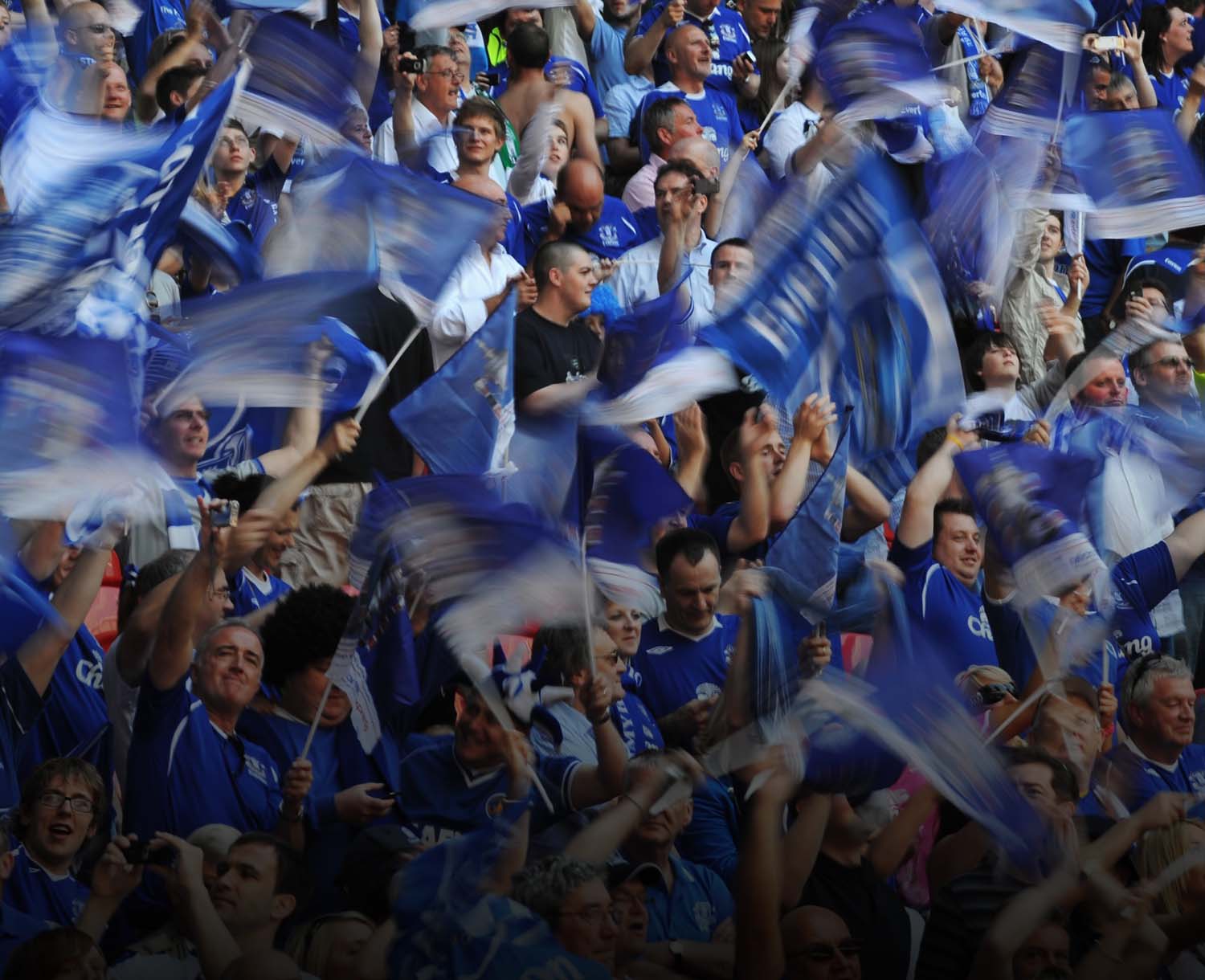The 21st Century thus far has been a barren epoch for a club accustomed to success visiting itself on Goodison Park (or Anfield before it) at regular intervals. Prior to this agonising period that elongates with every passing season of failure or stagnation, the longest stretch Everton had gone without a trophy was 18 seasons, accounting for the disruption of World War II. Come the latter stages of next season, we will equal the number of actual trophy-less years between 1939 and 1963 at 24.
Surveying the wreckage of the past four years and looking beyond over the last two decades of the Blues' history since the last serious scrape with relegation in 1998, you can pick out the moments where it felt like Everton were actually moving forward again.
Walter Smith, a no-nonsense Scot who won everything going north of the Border, brought the rather vain hope of emulating the Sir Alex Ferguson effect at Manchester United but, after landing some promising signings, his spell on Merseyside eventually foundered on the financial rocks of the last days of Peter Johnson's reign.
The reconstruction that was required under his successor, David Moyes, was painstaking at times and necessitated man-management abilities and shrewd transfer business but, for a healthy percentage of his tenure, there were also tangible signs of progress.
The dour Scot may have ultimately bumped his head too many times on a glass ceiling that he never seemed to believe could be broken (until Leicester City smashed through it when the comfortable status quo in the upper echelons of the Premier League was gloriously routed three years after he departed Goodison Park) before he sought a route into the top four for himself with the Old Trafford hot seat but there was planning and a methodology under Moyes — not to mention a few exhilarating moments in Europe, a brush with the Champions League and a trip to Wembley for an FA Cup Final along the way.
Players were recruited based on an identified need, often through careful scouting and deliberation, and there was enough of a togetherness, a spirit and a determination that meant that, regardless of their position in the table or ultimate failure to crack the top four, an Everton team under Moyes was always capable of beating almost anyone with the backing of their home crowd. (Away from home against the top clubs was a different story, of course, and that psychological weakness featured prominently in the epitaph of the Glaswegian's reign.)
Roberto Martinez was not a universally popular appointment when he succeeded Moyes in 2013; misgivings over his defensive record with Wigan Athletic ultimately proved well-founded. But perhaps no one was more responsible than the indefatigably optimistic Catalan for sparking genuine hope that Everton could dine again at the Premier League's “top table”.
The way he embraced Everton's history, his affinity for attacking, possession-based football and his readiness to blood some of the club's emerging young talent came as a breath of fresh air after those last few years of stasis under his predecessor. From upgrades to Finch Farm and a focus on on-site accommodation for the Academy's players to squad-building and infusing the team with a new playing ethos, he had a long-term vision for Everton, one that allowed Evertonians to believe again.
It was Martinez's arrival, combined with his introduction of Gerard Deulofeu, acquisition of Romelu Lukaku (first on loan but, crucially, in a permanent deal the year after), and promotion of Ross Barkley and John Stones, that provided a catalyst for the current trend of sold-out games home and away and record season-ticket uptake.
The mood was reflected in the spate of new chants that emerged from that first season as the feel-good factor grew, only to come crashing down amidst the crushing realisation that for all his positivity and passion, Martinez was frustratingly intransigent and incapable of either setting out a defence or managing matches with any consistency. When the end belatedly came for him — his team's complete capitulation at Anfield in April 2016 should have been the final straw — it was merciful and unavoidable.
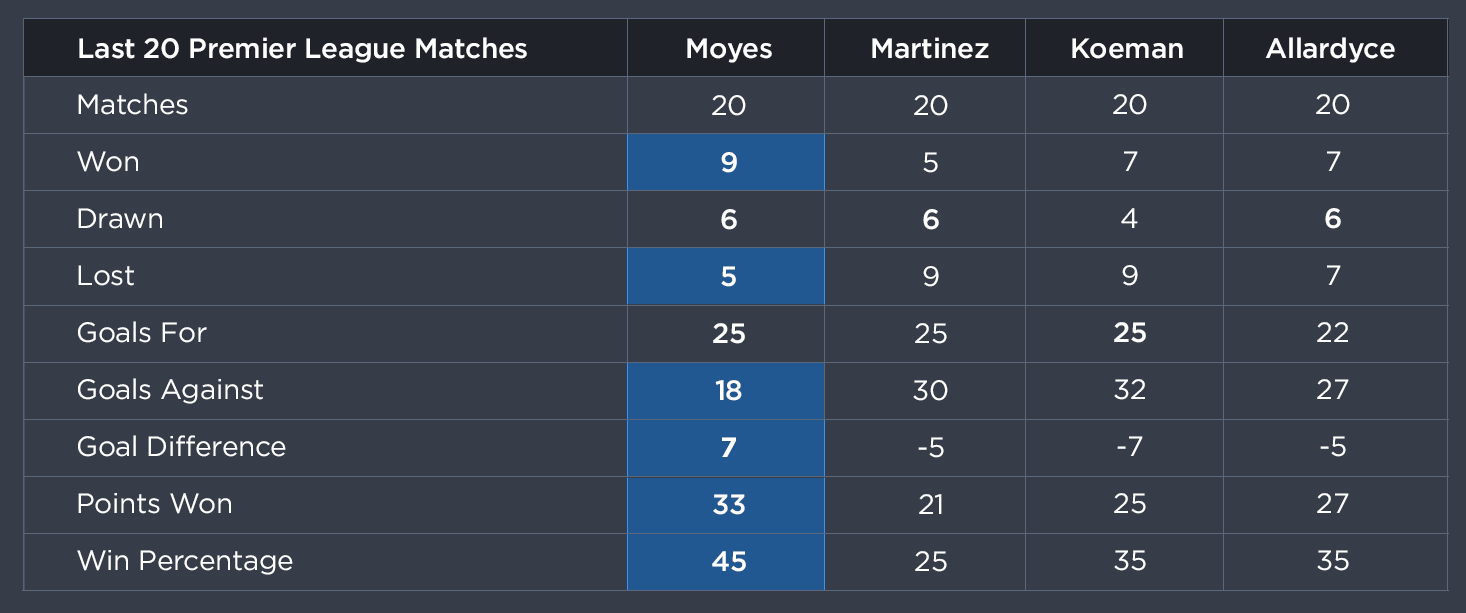
Again, though, in retrospect, what Martinez offered for a brief moment is what Everton need to rediscover as 2017-18 draws to a close and vital decisions concerning the future direction of the club become ever more pressing. The appointment of Ronald Koeman felt like the natural step to build on the more positive aspects of what the Catalan had put in place. Given his experience with Southampton, the scouting talents of Steve Walsh, and Farhad Moshiri's financial muscle, the sense was that the necessary pieces were there to deliver on the Dutchman's stated three-year project of vaulting the Toffees into the Champions League.
The reality was, of course, quite different and the scale of the mess that was created by Moshiri's first footballing appointments not only led to the panicked installation of Sam Allardyce as Koeman's replacement last November but also leaves the club facing yet more significant — read: expensive — rebuilding work this summer. That has surely taken the option of another short- to medium-term hire off the table. Instead, the club needs to hire someone with a similar time horizon and outlook as Martinez; someone not looking to leap off the Goodison Park stepping stone within three seasons but prepared to bed in for five years or more to nurture a young squad and build a winning team.
Time for another taxi
If there is one thing has become glaringly obvious — to be honest, it was obvious from the outset; what has transpired over the past few months has only confirmed it — it's that Allardyce should not be the one tasked with taking Everton forward.
It's true that very few Evertonians wanted him as manager when the club first sounded him out to replace Koeman last October. By the time he was approached a second time with a little more desperation as results worsened under Unsworth and fear of a relegation battle set in, a greater proportion of the supporter base was grudgingly accepting that the last resort was required.
The more you see and hear of Allardyce, though, the more you feel that his modus operandi in his time at Goodison has been as much about self-promotion and self-preservation — of his image and reputation within the game and how he would like to be regarded once he has left it — as it has about protecting Everton's top-flight status.
There have been clear opportunities for him to ingratiate it himself to a wary fanbase, much of which could have been won over if the journeyman boss had shown an ounce of imagination and forward thinking or offered an inkling that (particularly with players like Ademola Lookman and Nikola Vlasic) he had given the long-term development of the side a moment's consideration over the past few months. Instead, he has been exposed for the limited coach that the wider game knew him to be.
He extolls his own virtues as a man of football science and data who can prey on opposition teams' weaknesses but has overseen some heavy defeats in his brief time with Everton. As unpalatable as his appointment was, at the very least, Evertonians felt that Allardyce's presence might see the Blues grab the odd top-six scalp and restore some pride against those clubs over the last two thirds of the season. Instead, Blues fans have been forced to endure thrashings at the likes of Arsenal and Tottenham and two meek defeats at home to the Manchester clubs; matches seemingly surrendered as there was no hope of winning them anyway.
He talks of Everton's away record like some incurable malaise that he hasn't had five months to solve. It's a ready-baked excuse; a free pass to gloss over some horrendous results, boring performances and a near total absence of ambition in matches on the road.
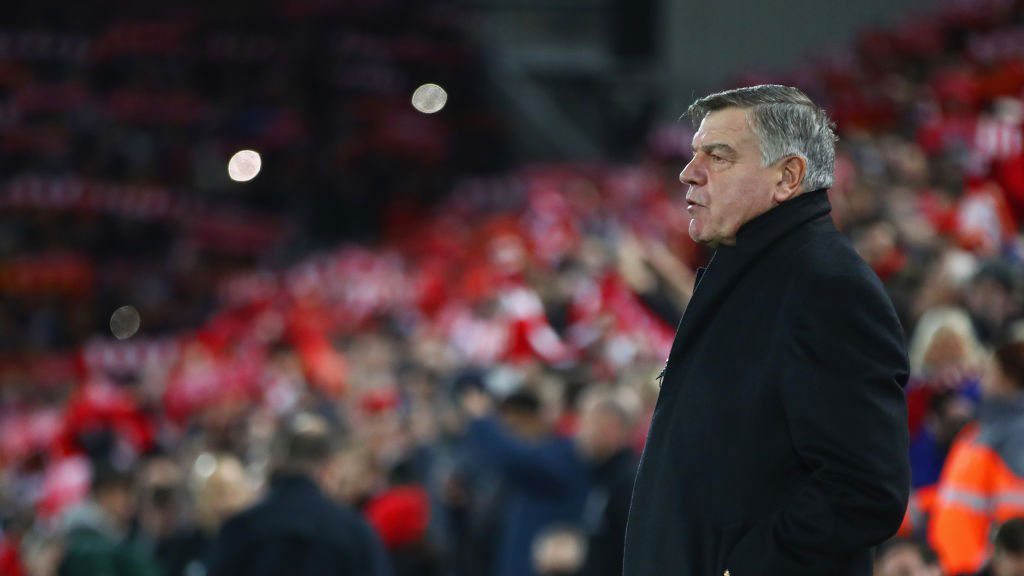
Allardyce's initial brief — steer Everton away from a threat of relegation that appeared in the wake of the disasters against Atalanta and Southampton to be a lot greater than it actually was — was, for all intents and purposes, fulfilled by Christmas. Perhaps his plan was to grind out the rest of this season on a one-dimensional footing and then reveal a hitherto hidden side to his coaching personality next season that would wow skepti —
On second thought — never mind.
Despite his laughable assertion that criticism of — and opposition to — his tenure at Everton is coming from a small minority of “unprofessional speculators” on social media (he said a very similar thing when he was at West Ham before their owner assessed the mood and let him go, it shouldn't be forgotten), Allardyce will know that he isn't popular with many — it's almost certainly most, possibly an overwhelming majority — Everton fans. He can't have failed to hear the chants inviting him to take leave of this fine club (in more direct language, of course!) coming from the travelling Blues at a couple of recent away games.
He will also have been acutely aware of the implications of every defeat which is probably why he treats every draw like a victory. In the context of him carrying out the job for which he was hired, amassing the points to stave off relegation has been key.
The idea that Allardyce is going to morph into the kind of manager that Moshiri was looking for when he appointed Koeman is fanciful. All of the evidence to this point suggests that retaining the West Midlander for the remaining 12 months of his contract would be a recipe for further stagnation; another lost season in context of the rapidly diminishing window of opportunity to catch the top six that Everton's de facto owner himself outlined as his big challenge.
Combined with the fact that disdain and distaste for the man in the dugout isn't going to go away next season — it will remain, ready to flare up with the next poor result — it makes Allardyce's continued tenure as Everton manager effectively untenable. That is unless he can undergo a wholesale transformation of character, outlook and footballing style in very short order — and, let's face it, that just isn't going to happen.
Keeping up with the Joneses
If Everton's continuing travails and desperate wait for silverware weren't painful enough, the sight of Liverpool pulling themselves up by the bootstraps in recent years and restoring their club to the upper reaches of not only the domestic game but the European scene as well has layered on the torture for Evertonians this term.
Could there be a bigger indignity to the Blue half of Merseyside than the rabble from across the Park deeming a Merseyside derby to merely be an irritating distraction on their march towards the Etihad Stadium and the last four of the Champions League beyond, one in which they could field a weakened team and still coast more or less unruffled to a goalless draw?
For all their apparent foreign curiosity, PR bungles and mis-steps in the transfer market over the years, the reds' American owners made a solid appointment in luring Jürgen Klopp to Anfield and are now reaping the benefits. The well-founded fear among Blues that after a succession of managerial failures, “one day, they're going to get it right” appears to have finally been realised.
Of course, it helps that Liverpool's profile and financial muscle means they can attract top-tier managerial talent and some of the world's best players, almost certainly in a manner in which Everton can't. Nevertheless, there is scope for grudging admiration — not to mention a blueprint to emulate for the Blues — in how the eccentric German has gone about building and moulding his team.
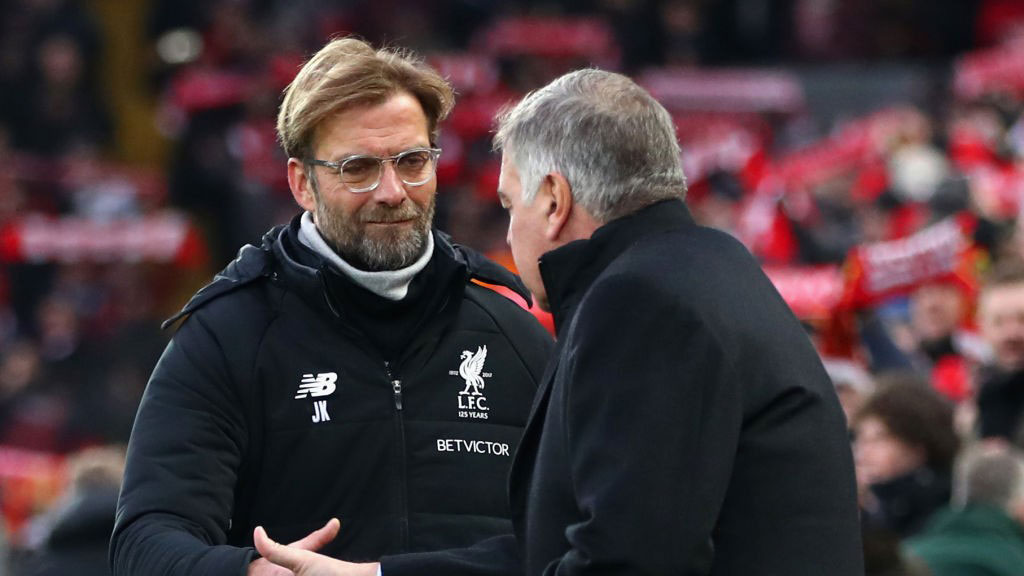
Helped by the sale of two of the reds' best players to Barcelona for massive transfer fees, Klopp has assembled a team around a specific plan, at the heart of which lie pace and peerless fitness and an ethos often based on Blitzkrieg attacking early in matches to attain an early cushion and then hit teams on the counter-attack as they try to fight their way back into the game.
It was an approach fundamentally undermined before by a soft defensive centre but with that piece of the jigsaw seemingly put in place thanks to the sale of Philippe Coutinho (have they even noticed he has gone?) and the purchase of Virgil van Dijk, the serial under-performers of the old “top four” and “big five” look like they've found a formula for consistent success.
The same could be said of Tottenham Hotspur, of course, Everton's one-time brothers in arms when it came to perennial under-achievement. Having poached the right manager from Southampton in the form of Mauricio Pochettino, Spurs are now realising the benefits of having a man in the dugout who blends vision with pragmatism, fitness and stamina with organisation and flair.
Where previous bosses of both of those clubs and their paymasters have thrown cash around on over-priced misfits — sound familiar? — like Andy Carroll, Christian Benteke, and Lazar Markovic on one hand and Roberto Soldado, Darren Bent, Paulinho and Moussa Sissoko in the other, Klopp and Pochettino appear to have made targeted signings with specific needs in mind.
Where the former signed Sadio Mané and Mohamed Salah for £34m and an initial £37m respectively and the latter picked up Hueng-Min Son for £22m, Toby Alderweirald for £11.5m, Delle Alli for £5m and Eric Dier for £4m, Everton spent £45m on Gylfi Sigurdsson, £24m on Davy Klaassen, £28m on Yannick Bolasie and and £25m-plus on Michael Keane while making over-the-hill Wayne Rooney their highest-paid player.
The result of this throw-it-at-the-wall-and-see-what-sticks approach from Messers Walsh and Koeman was the “train wreck” of this season. It felt at the time like there was enough of a foundation in place for those signings to work if key roles like striker and left-back could be addressed last summer; the fact that they weren't just increased the likelihood that it would all come off the rails as quickly and easily as it did.
We thought after 11 years of Moyes and a false dawn under Martinez that the combination of massive expenditure and a shorter-term “Hollywood manager” could provide the fuel to propel us into the top four. With that idea in tatters, what Everton need now is structure, stability, a revised plan, continued focus on one of the most productive youth systems in the country and the men prepared to dig in and oversee it all.
Keeping hope alive
There's been a fair bit of discussion over the loss of Everton's identity of late, amid the changing shape of the club on and off the field. Against the backdrop of an ever-richer Premier League and sky-high wages, the image of a spirited, close-knit team backed by pragmatic team-building within a financial straitjacket overcoming the odds to remain on the cusp of the top-four picture has been replaced by an accelerated tilt at becoming part of an elite seven clubs in the Premier League fighting it out for the title and Champions League places.
Perhaps it was inevitable that some of what has characterised the club in recent years would be lost during the transition away from the Bill Kenwright era to the Farhad Moshiri-led revolution, but had the Monaco-based billionaire's changes been accompanied by overnight success, not as much might have been made of the perils and early effects of this shift to a new order as “outsiders” take control.
At the same time, there are concerns that the shifting demographic at Goodison Park has ushered in a more apathetic clientele that is more impatient and harder to please. More realistically, though, the atmosphere might simply be a broader reflection of a deep-seated frustration felt by supporters at an apparent loss of effort, passion and cohesion from the team on the field (particularly at home against superior opposition) on the one hand and a general lack of direction off it on the other.
And, as one of the most “un-Everton” appointments imaginable, Allardyce's tenure is central to that disillusionment; Blues fans who waited patiently through the Moyes era of stability, were given hope of progression under Martinez, Koeman and Moshiri but have, thus far, seen all that hope extinguished.
Daniel Storey, Football365
So, if there is a sense of frustration, discontent and, perhaps, alienation from the past at Goodison, the situation isn't irrevocable or irretrievable. Despite an utterly forgettable year with almost nothing that will live on in the memory as a high from 2017-18, Evertonians are still buying season tickets in record numbers. That speaks to an enduring hope that better days are around the corner, but the events of the past year mean that Moshiri and the Board's next moves are of vital importance.
As a man who doesn't appear to have run a company of this scope before and who is not a “football man” by his own pedigree, an element of trial and error was inevitable. And while his broader focus is in line with the Toffees' famous old motto, Moshiri deserves patience as he tries to undo years of decline, stagnation and false starts to end this tortuous wait for silverware and success.
Despite the mis-steps made so far — and, let's face it, Allardyce aside, most of them were taken with the broad agreement of the fans — a vein of ambition has run through what Moshiri has tried to implement at Everton. From appointing Ronald Koeman, a top-class manager on paper in terms of pedigree and potential, and Steve Walsh, a man regarded by some as the key to Leicester's unlikely title triumph two seasons ago, to the proposed new stadium at Bramley-Moore Dock, the new man and his attaché to the Board, Sasha Ryazantsev, have clearly been aiming high and in line with a strategy of restoring Everton to its rightful place among the elite of English football as quickly as possible.
Again, with the benefit of hindsight, the examples set by our former peers who have left us in their wake, and Evertonians' innate sense of their club, a clear picture of what fans want from Everton now is emerging. They want to restore pride in their team, starting with the man in the dugout; they want a clear direction and philosophy under-pinning everything on the playing side, from playing style to continued fostering of youth development to player recruitment and the jettisoning of under-performing or sub-standard personnel.
Off the pitch, they want strong, visible leadership capable of bridging the commercial gap that has grown in recent years between Everton and the clubs above them. And, of course, they want to see tangible progress on the proposed new stadium on the banks of the royal blue Mersey.
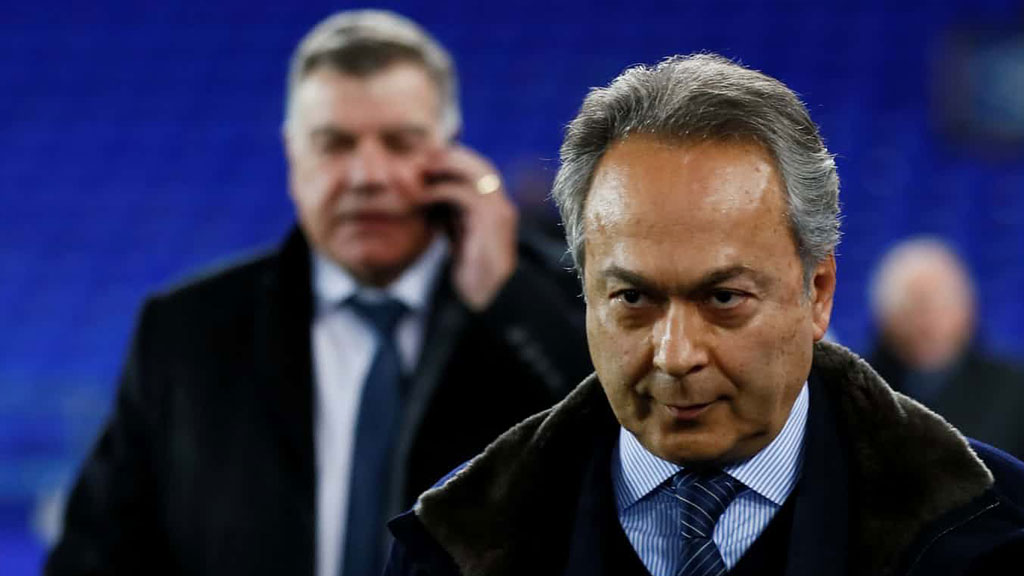
While there has been no inkling about how the hierarchy might proceed this summer as far as Sam Allardyce is concerned — end the current manager's contract early or stick with him for another 12 months at least — beyond a couple of Sunday tabloid articles and rumours on social media suggesting the former scenario, encouragement can be taken from the pursuit of Marcel Brands, one which is squarely at odds with retaining Allardyce. After all, why court one of the game's most admired technical directors and leave in place a manager with no pedigree, affinity for footballing style or record of achievement (beyond salvation from relegation and a brief flirtation with the top six and European football 12 seasons ago)?
Similarly, if Moshiri was prepared to pay as much as a reported £15m in an attempt to lure Marco Silva away from Watford last year and also make overtures to Shakhtar Donetsk's Paulo Fonseca, it very clearly illustrates the kind of management team he wants to put in place. It makes little sense, therefore, to keep Allardyce around seeing as he has exhibited none of the traits the hierarchy were looking for in Koeman's long-term successor.
If the last five years have demonstrated anything it's that Evertonians have been at their most upbeat and their most engaged when they've had something to genuinely believe in with regard to the rebirth of their club. Away from the pitch, the promise of a new ground at Bramley-Moore Dock fuels hopes of future grandeur if the Board are able to surmount the funding obstacles but, in the meantime, fans need a reason to be inspired by their manager and players in a way that they were during Martinez's first season in charge.
If there has been impatience, it has come as a result of the feeling that the tools were there — in terms of personnel under Martinez and finances under Koeman — to sustain a viable push for the top four but the execution was critically flawed. Going forward, you get the sense that the fans would be quite prepared to back the right manager over the long haul if it meant a return to attractive football, a focus on signing younger, hungrier players, addressing key positions of weakness in the team and nurturing the Academy's young talent.
Every appointment is a gamble to a certain degree — for every safer appointment like a Guardiola, Conte, Mourinho or Klopp there's a leap of faith on a Pochettino, Wenger (back in the day) or Carvalhal — but for Everton there appear to be few rewards to be gained from sitting on their hands this summer and hoping the current incumbent of the managerial hot seat can undergo some magical transformation.
Ambition was the watch word of the summer of 2017. It needs to be just as much so this year.

